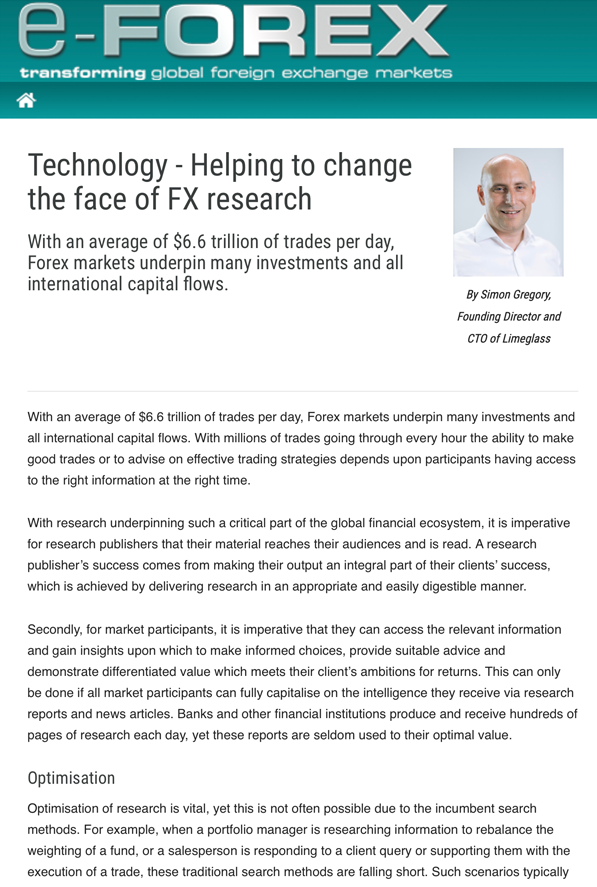Technology – Helping to change the face of FX research
With an average of $6.6 trillion of trades per day, Forex markets underpin many investments and all international capital flows.
With an average of $6.6 trillion of trades per day, Forex markets underpin many investments and all international capital flows. With millions of trades going through every hour the ability to make good trades or to advise on effective trading strategies depends upon participants having access to the right information at the right time.
With research underpinning such a critical part of the global financial ecosystem, it is imperative for research publishers that their material reaches their audiences and is read. A research publisher’s success comes from making their output an integral part of their clients’ success, which is achieved by delivering research in an appropriate and easily digestible manner.
Secondly, for market participants, it is imperative that they can access the relevant information and gain insights upon which to make informed choices, provide suitable advice and demonstrate differentiated value which meets their client’s ambitions for returns. This can only be done if all market participants can fully capitalise on the intelligence they receive via research reports and news articles. Banks and other financial institutions produce and receive hundreds of pages of research each day, yet these reports are seldom used to their optimal value.
Optimisation
Optimisation of research is vital, yet this is not often possible due to the incumbent search methods. For example, when a portfolio manager is researching information to rebalance the weighting of a fund, or a salesperson is responding to a client query or supporting them with the execution of a trade, these traditional search methods are falling short. Such scenarios typically require scrolling through an email inbox or using a traditional text-based search and then checking each document individually by using CTRL+F which make their jobs harder to do, rather than easier.
Fundamentally, some of these incumbent search functions, including ‘CTRL+F’, pre-date the internet by a number of years. In a world where other elements of financial technology see a blistering rate of innovation, the fact that tools to help maximise the value from research documents have barely moved forward is a staggering oversight.
Traditional keyword-based search inherently produces narrow, ineffective results and miss other relevant words or phrases within the context of the subject. For example, a search on the ‘pound to dollar rate’ would only reveal sections of reports that referred to those particular words. Other relevant sections containing words and phrases such as ‘sterling’, ‘cable’, ‘greenback’, ‘GBP/USD’ or simply ‘GBP’ would be overlooked and adjacent contextual references to topics that affect the Forex market, including the current UK interest rate or latest announcement by the US Federal Reserve would also be missed.
Imagine you get a call from a client asking for relevant information concerning the morning’s drop in the AUD price. You would want to answer the query with accurate, timely information about the cause, along with announcements from the Reserve Bank of Australia’s (RBA) Governor stating what was said, the RBA international reserves portfolio, and other influencing factors. You would also want to quickly access information about previous recent dramatic price moves and relevant research. If you are not able to respond quickly and accurately, you may inadvertently impede your client’s decision-making and potentially damage your relationship with that client. Money can be lost, relationships soured, and opportunities missed because the full-text search software that forms the bedrock of the financial services sector is based on a technology developed to solve 1990’s problems, not to provide 21 st century solutions. That isn’t to say that innovation should take place for the sake of innovation and the age of the technology used isn’t always a problem. The fax machine as a concept is over a hundred years old, and for the most sensitive wet-ink transactions still does the job well. However, the underinvestment in new solutions means that gleaning value from a large volume of multi-thematic reports, generated by a number of discrete sources is an inefficient and frustrating process. The sheer amount of data being produced on a daily basis means that these old tools are simply outgunned in the fight for better information.
There is clearly value to software that understands research in in a manner more akin to how a human would read and consume it
While it’s easy to use the cliched ‘in these uncertain times’ line, as so many of the socio-economic factors that underpin a currency’s value are in turmoil right now, the Forex market is always fluid and fast moving in its nature. Traders need a timely and comprehensive overview to make smart decisions. A key part of this is efficient access to research, in which participants can extract the valuable insights sought from the research reports at the very instant it is required in order to inform their trading decisions.
The technology tools that are being used within FX
FX research highlights problems that are systemic to the entire financial services sector. New methods are needed to cut through the huge volumes of financial research that are being generated and enable research consumers to quickly find and assimilate the most important and relevant information.
Some of the most exciting developments often sit under the guise of marketing buzzwords and acronyms taken from broad technological disciplines such as artificial intelligence (AI), machine learning (ML) and natural language processing (NLP). Financial research is an example of a real-world use-case where the sheer volume of words and their meanings overwhelm the ability of the individual to consume and act upon information. In research optimisation, there is an application where the underlying technologies are beginning to unlock the potential for scalable solutions rather than just marketing fluff.
Modern technology has the capacity to immediately and automatically analyse documents in real-time. Key concepts in the research can be identified by synonyms and context, which is often even dependent on the location within the document or by utilising other relationships such as ontologies and knowledge graphs. Rich NLP techniques can ensure important financial concepts are identified in the correct perspective.
New methods are needed to cut through the huge volumes of financial research that are being generated
The advantages of this are clear. If a user searched for the words ‘foreign exchange’ and ‘UK’, the platform would also flag up paragraphs where the following words are used: ‘FOREX’, ‘forex’, ‘foreign currency’, ‘currency exchange’, ‘United Kingdom’, ‘Britain’, ‘Great Britain’, ‘London’, ‘BoE’, ‘Brexit’, ‘London Stock Exchange’, ‘LSE’ and more, as these are relational words and phrases that are used in real-world scenarios. The result is that each paragraph can be considered in relation to the implied search terms of the user and within the context of the whole document. The whole process provides a fast and convenient method of assessing relevant information.
The personalisation of Forex research
A Forex research firm may know the areas that their clients are interested in, but if there is no ability to surface or distribute the precise topics the readers are interested in, the material will remain generic and have only limited value. There is clearly value to software that understands research in in a manner more akin to how a human would read and consume it. For example, highlighting or surfacing only the paragraphs relevant to any given recipient in response to a search query or even proactively sending them directly to the market participant based upon their interests start to become a possibility. Personalising the research experience for each and every market participant has a clear benefit and is surely the ultimate goal for all research producers and consumers. Assessing incoming reports for relevance becomes faster and by overcoming the inefficiencies of information overload, the assessments of the information contained in them can become much more informed. Engagement with research and the quality of the insights gleaned from it is enhanced and improves financial decision making.
Whilst there will always be money to be made by individuals with the ability to rapidly understand the significance of new information and trends, there is a distinct advantage to getting there first. That is what this new generation of tools has to offer Forex traders; better, faster and more informed decision making.
Through the adoption of smart technology, financial research becomes a strategic tool
Conclusion
Dramatic world events, such as the global pandemic, affect all aspects of life. There are immediate and tangible impacts for the Forex markets; increasing unemployment rates, stock market instability, political turbulence, government borrowing and country mobility data all feed into the Forex volatility. In normal times, a Forex analyst can look to market charts, predicted scenarios and previous trends to inform their decisions in response to these fluctuations. However, with limited
relevant data sets to be found, analysis of past performance cannot be a reasonable indicator of future developments. This is why so-called black swan events present such opportunity, and such risk.
Therefore, it is vitally important to remain as informed as possible with relevant and timely research to support traders as they navigate through these turbulent times. It is here that the demand for efficient and personalised research comes into the fore to offer the best support for Forex participants navigating these times.
Ultimately, through the adoption of smart technology, financial research becomes a strategic tool. It provides a competitive edge for Forex market participants who grasp the emerging opportunity and realise that digitally enhancing their research will form an essential part of their wider technology ecosystem.
News & Insights
Simon Gregory
CTO & Co-Founder








